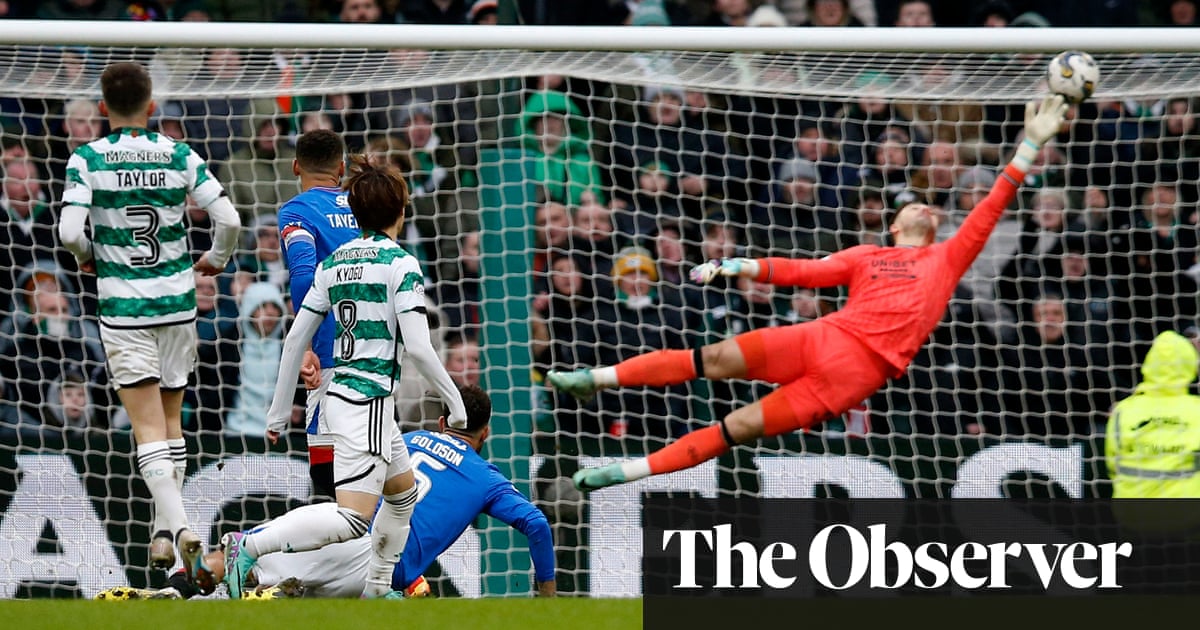
A number of churches in and around Glasgow were subject to vandalism and anti-Catholic abuse over the weekend, the Guardian has learned, as Rangers supporters rampaged through the city centre on Saturday.
Windows were smashed at the St Maria Goretti church estate in Cranhill, north-east Glasgow. At another church, which has asked not to be identified, a banner with anti-Catholic slogans was draped across railings in time for evening mass, before it was removed by church officials. There were further reports of abusive heckling of those within church grounds. The Guardian understands that two incidents were reported to Police Scotland.
Neil Gray, the newly elected MSP for Airdrie and Shotts, in whose constituency one of the incidents took place, said he has received a number of complaints about anti-Catholic bigotry and racism from the weekend and raised them with the police. “We cannot tolerate bigotry, hatred and racism in any form and football can no longer be a front for this behaviour. I hope those responsible are brought to justice quickly.”
On Tuesday afternoon, MSPs from across the chamber called for action following the weekend’s shocking scenes. Twenty people were arrested and three officers were injured after the crowd of Rangers supporters that marched on Glasgow’s George Square to celebrate their club’s Scottish Premiership win became increasingly disorderly, throwing missiles and flares at the police as they tried to disperse them. Police Scotland has since set up a specialist team of investigators to track down those involved and review online and video footage of the day.
Rangers football club condemned a “small minority” of fans who “besmirched the good name” of their club.
The justice secretary, Humza Yousaf, responded that, while he would prefer to work with Scottish footballing authorities and Rangers football club to ensure that Saturday’s events were not repeated, parliament would consider legislating for strict liability, whereby the club would be held responsible for the behaviour of its fans at matches.
“Strict liability should be on the table,” he told MSPs. “Other suggestions I’ve heard include potentially an independent regulator, as has been discussed for the English game … the clubs can also take stronger action. Rangers football club have committed to work with Police Scotland. I hope any supporter, any fan, anybody involved in Rangers Football Club that has been found guilty of being involved in anti Catholic bigotry or vandalism or disorder will get a lifetime ban from the club.”
Jeanette Findlay of the anti-discrimination charity Call It Out, welcomed the fact that the first minister, justice minister and other senior politicians have described the abuse at the weekend as “anti-Catholic bigotry and anti-Irish racism”. “You have to call it out for what it is, and this does mark a sea change.”
On Sunday, Nicola Sturgeon said she was “utterly disgusted by the Rangers fans who rampaged through the city”, condemning the “violence, vandalism and vile anti-Catholic prejudice on display”.
Findlay went on: “The figures are clear enough that around half of all reported religiously aggravated hate crime relates to anti-Catholic abuse. But condemning some Rangers fans as bigots and thugs is still a bit away from acknowledging the deeper structural issues at stake.”
She raised concerns that the Scottish government is unwilling to engage with the community on deeper inequalities. “Last summer, official figures showed clear evidence of increased incidence of Covid-19 deaths among the Irish community relative to all other ethnic groups in Scotland. But this was not properly investigated by the Scottish government.”
Duncan Morrow, professor of politics at the University of Ulster, who has previously chaired investigations into sectarianism and hate crime for the Scottish government, said he believed the social tolerance for the kind of behaviour witnessed in Glasgow was declining. “This is not just about the law, it’s about the culture, how do you deal with young people, how do they detach football from life or death identity issues?”
“Of course at the core of this is a problem that started as anti-immigrant, anti-Catholicism but has spawned a problem that extends beyond that. I stick with the language of sectarianism because there is no doubt to me that it has spawned an interactive, tit-for-tat culture, especially on social media.
“What is urgently needed is that those who do see it in their own realms lean into it, and that has been the problem with football. You have a Scottish Football Association group for equality and diversity which doesn’t name this as an issue. You have tackling racism as a core issue for Uefa but there is nothing on this.”












